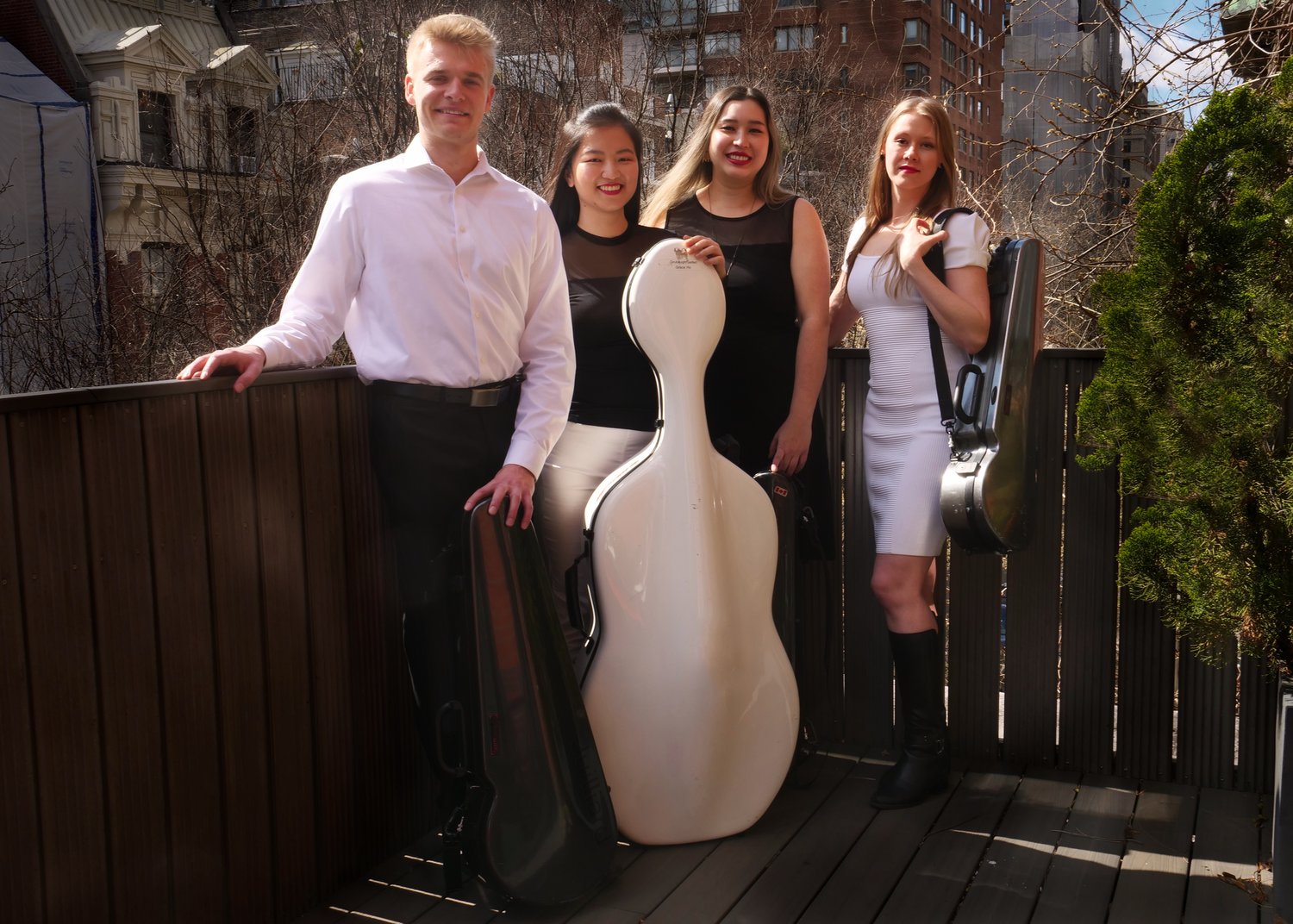The Ulysses Quartet has been praised for their “textural versatility,” “grave beauty” and “the kind of chemistry many quartets long for, but rarely achieve” (The Strad), as well as their “avid enthusiasm … [with] chops to back up their passion” (San Diego Story), “delivered with a blend of exuberance and polished artistry” (The Buffalo News). The quartet “promise to bring as much sophistication, imagination and vitality to Beethoven’s other quartets as they will to music by a panoply of composers from long ago and today” (Gramophone).
Founded in the summer of 2015, the group won the grand prize and gold medal in the senior string division of the 2016 Fischoff National Chamber Music Competition and first prize in the 2018 Schoenfeld International String Competition. In 2017, the quartet finished first in the American Prize and won second prize at the Osaka International Chamber Music Competition. They were winners of the Vietnam International Music Competition in 2019. Ulysses garnered a career development grant in the 2016 Banff International String Quartet Competition.
The concert is followed by a reception where you can meet the artists.
All are encouraged to attend.
Komitas
Selected Armenian Folk Songs
Seth Grosshandler
Dances for String Quartet (World Premiere)
Fanny Mendelssohn Hensel (1805—1847)
String Quartet in E-flat Major
Adagio ma non troppo
Allegretto
Romanze
Allegro molto vivace
I N T E R M I S S I O N
Christina Bouey
Soul
Felix Mendelssohn (1809—1847)
String Quartet No. 3 in D Major, Op. 44, No. 1
Molto allegro vivace
Menuetto. Un poco allegretto
Andante espressivo ma con moto
Presto con brio
Program subject to change.
KOMITAS: Selected Armenian Folk Songs
Komitas, born Soghomon Soghomonian, was an Armenian priest, musicologist, and composer, who is considered to be the founder of modern Armenian classical music and a pioneer of ethnomusicology. Orphaned at an early age, Komitas received his education at an Armenian seminary, was ordained, and went to Berlin to study music. Komitas acknowledged that he used his Western training to build a uniquely Armenian tradition. He dedicated his life to reclaiming native melodies of his people, collecting and transcribing over 3,000 pieces of Armenian folk music, (of which half were unfortunately lost).
Komitas’ tragic life, which mirrored the fate of his own people, has given him an almost mythical dimension and has made him a symbol of the suffering of an entire nation. Having witnessed relentless cruelty and massacres during the Armenian genocide, Komitas eventually suffered a mental breakdown and would later die in a psychiatric hospital in Paris.
Partly due to his traumatic story, Komitas’ music has become an enduring symbol of a home deeply treasured by the Armenian diaspora. Karen Ouzounian describes his music as:
At times joyously upbeat and at times melancholic, these folk songs were written before the genocide that scattered Armenians across the world. But for so many Armenians this music provided a connection to their homeland as they built new lives abroad; and for listeners they provide a window into the Armenian soul.
SETH GROSSHANDLER: Dances for String Quartet (World Premiere)
Seth Grosshandler received his B.A. in Music from Reed College in Portland, Oregon in 1979, with a focus on music composition. His thesis composition — Quintet for Piano and Winds — won the Reed College Class of 1921 Award, given for “creative work of notable character, involving an unusual degree of initiative and spontaneity.” He then spent a year in Paris, France, studying composition and orchestration, before going to law school. During law school and throughout his brief (35-year) gig as a lawyer, he performed as a pianist in several chamber music concerts in the New York City and Chicago areas. Since retiring as a lawyer in mid-2018, he has focused again on composition, while continuing to perform his own and others’ works.
In 2023 Ulysses Quartet premiered Grosshandler’s Suite for Clarinet Quintet with clarinetist Oskar Espina Ruiz, a warmly engaging piece that harkens back to Felix Mendelssohn with its delightful play with dance modalities. Today’s performance of Dances for String Quartet is the world premiere.
FANNY MENDELSSOHN HENSEL: String Quartet in E-flat Major
Older sister to her significantly more famous brother Felix, Fanny Mendelssohn Hensel was an extraordinarily gifted musician. Today’s history books portray Fanny as the talented and overlooked sibling to her brother, rather than as the influential performer and prolific composer that she was. While Felix went on to enjoy a very successful public career in music, Fanny was encouraged to follow convention and get married and raise a family. But as a wife and mother, Fanny did foster a private musical career through weekly house concerts for audiences of up to 200 guests.
Fanny composed an estimated 450 works, some of which were published under her brother’s name, but the majority of which still remain unpublished. In her String Quartet in E-flat Major, as in much of her repertoire, Fanny’s admiration for Bach, Mozart, Beethoven, and Felix Mendelssohn is quite clear.
With a flair of Romantic-tinged Classicism, the first movement opens with an Adagio, a departure from classical tradition that certainly raised an eyebrow from her brother. The movement unfolds rhapsodically, reflecting at length over its opening phrase, a downward melodic gesture ending with a sigh motive.
The Allegretto that follows is fleet and acrobatic, but with a scurrying middle-section fugato like the scherzo from Beethoven’s Fifth Symphony. The third-movement Romanze is the emotional heart of the quartet, remarkable for its extraordinarily wide expressive range and heart-wrenching chromaticism.
The final movement opens with a flurry of whirlwind figuration, which rarely stops to catch its breath, and goes by in a fiery blur.
CHRISTINA BOUEY: Soul
Soul written by Ulysses Quartet’s own Christina Bouey is meant to awaken the listener’s emotions and feel whatever their essence needs to feel in that moment. When Christina felt inspired to write the piece, she was on a walk by the Hudson River in Manhattan and was pondering what it meant to live, experience and encounter different aspects of life with deep meaning and intention.
FELIX MENDELSSOHN: String Quartet No. 3 in D Major, Op. 44, No. 1
Written in 1837, the three quartets of Felix Mendelssohn’s Opus 44 mark a happy time in Mendelssohn’s life and career. The young composer’s numerous successes had installed him as the most renowned musician in Europe. In 1835 he was appointed Music Director of the Leipzig Gewandhaus Orchestra, which would grow into one of Europe’s premier ensembles under his leadership. And on a personal note, when Mendelssohn began writing Opus 44, he had recently married the lovely Cécile Charlotte Sophie Jeanrenaud, with whom he would go on to have five children.
The joy that filled these years is clearly translated in the exuberance of Opus 44. Though the Quartet in D Major was the last of the set to be composed, it was published as Opus 44, Number 1. In a letter to violinist Ferdinand David, Mendelssohn writes:
I have just finished my Third Quartet, in D major, and like it very much. I hope it may please you, as well. I rather think it will, since it is more spirited and seems to me likely to be more grateful to the players than the others.
The first movement is a rather epic creation, built on a grand scale and full of energy. Although it is technically composed in a sonata-allegro form, the experience of hearing it evokes not so much a strict form as an odyssey, a journey to many different lands.
Mendelssohn’s reverence for the airy structures of Classicism continues into the second movement, a gentle Minuet that unfolds in a gorgeous blossoming of harmonies. The third movement, Andante espressivo, offers a lilting intermezzo style, with a playful obbligato line that contrasts an elegant melody. Everyone unites for the final Presto con brio, a perpetual-motion caper that easily morphs into a jauntily poised melody.
Ulysses Quartet
Christina Bouey and Rhiannon Banerdt, violins
Peter Dudek, viola
Grace Ho, cello
The Ulysses Quartet has been praised for their “textural versatility,” “grave beauty” and “the kind of chemistry many quartets long for, but rarely achieve” (The Strad), as well as their “avid enthusiasm … [with] chops to back up their passion” (San Diego Story), “delivered with a blend of exuberance and polished artistry” (The Buffalo News). The quartet “promise to bring as much sophistication, imagination and vitality to Beethoven’s other quartets as they will to music by a panoply of composers from long ago and today” (Gramophone).
Founded in the summer of 2015, the group won the grand prize and gold medal in the senior string division of the 2016 Fischoff National Chamber Music Competition and first prize in the 2018 Schoenfeld International String Competition. In 2017, the quartet finished first in the American Prize and won second prize at the Osaka International Chamber Music Competition. They were winners of the Vietnam International Music Competition in 2019. Ulysses garnered a career development grant in the 2016 Banff International String Quartet Competition.
The quartet’s members hail from Canada, the United States and Taiwan. They have performed in such prestigious halls as Carnegie Hall, Wigmore Hall, the Harbin Grand Theatre, Jordan Hall, and the Taiwan National Recital Hall. Performance highlights have included their debut at Alice Tully Hall along with appearances at the Chautauqua Institution (NY), Sociedad Filarmónica de Bilbao (Spain), Ciclo de Cámara y Solistas in Salamanca, the Picasso Museum in Málaga, Teatro Mayor Julio Mario Santo Domingo in Bogotá, Highlands Cashiers Festival (NC), Music Mountain (CT) with pianist Tanya Bannister, Chelsea Music Festival and PS21 (NY), National Gallery of Art (DC), Jasper Arts Center (IN), and San Juan Chamber Music Festival (CO). Their past season featured their Mexico City debut at UNAM, along with performances for Sociedad Filarmónica de Lima, Gretna Music, Yale School of Music with guitarist Ben Verdery, Kansas City Friends of Chamber Music, Fundación Juan March (Madrid), Sociedad Filarmonica de Vigo, Basel Kammermusik, and Chamber Music Society of Utica (NY). Other notable engagements have included the Buffalo Chamber Music Society, Chamber Music Society of Lincoln Center, Premiere Performances Hong Kong, National Arts Centre (Ottawa), and Cemal Reşit Rey Concert Hall (Istanbul).
In the fall of 2023, the Ulysses Quartet became GBH Music’s first-ever quartet in residence, a season-long partnership made possible by a generous contribution from the Mattina R. Proctor Foundation. Visiting residencies in recent seasons have included Louisiana State University, Ithaca College, Syracuse University, and Bucknell University. At Juilliard from 2019 to 2022, they were the Lisa Arnhold Fellows, serving as the school’s Graduate Resident String Quartet for 3 years. From 2016 to 2019, Ulysses was in residence at the Louis Moreau Institute in New Orleans, working with composer Morris Rosenzweig.
Ulysses recently released their debut album, “Shades of Romani Folklore,” on the Navona label. The quartet also has two new collaborative albums out: “Sea Change Quartets” by Grammy-nominated composer Joseph Summer, and “A Giant Beside You” with guitarist Benjamin Verdery. They also appear on Clovis Nicolas’s album “The Contrapuntist.”
The Ulysses Quartet believes intensely in the power of music to inspire, enlighten and bring people together. This is the guiding principle of the Ulysses Quartet Foundation, dedicated to the performance and promotion of classical music of the past and present day to benefit the broadest possible audience of music lovers and potential music lovers by expanding their understanding and appreciation of the musical arts. Ulysses aims to use this platform to raise the voices of underrepresented BIPOC and female composers. The quartet also offers interactive programs and workshops for all ages that serve to demystify the traditional repertoire while introducing audiences to diverse programming. Their programs enable participants to learn about the inner workings of a string quartet and to explore the connections between classical music and our world today. The group’s name pays homage to Homer’s hero Odysseus and his arduous homeward voyage, signifying the constant pursuit of artistic and personal ideals.
The members of Ulysses hold degrees from the Manhattan School of Music, New England Conservatory, Boston Conservatory, the Juilliard School, and University of North Texas. The musicians perform on instruments and bows graciously on loan from the Maestro Foundation and private donors. Ulysses is grateful for the support of Shar Music and Connolly Music as YSOA ambassadors.




